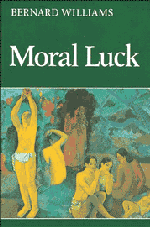Book contents
- Frontmatter
- Contents
- Preface
- Acknowledgements
- 1 Persons, character and morality
- 2 Moral luck
- 3 Utilitarianism and moral self-indulgence
- 4 Politics and moral character
- 5 Conflicts of values
- 6 Justice as a virtue
- 7 Rawls and Pascal's wager
- 8 Internal and external reasons
- 9 Ought and moral obligation
- 10 Practical necessity
- 11 The truth in relativism
- 12 Wittgenstein and idealism
- 13 Another time, another place, another person
10 - Practical necessity
Published online by Cambridge University Press: 05 June 2012
- Frontmatter
- Contents
- Preface
- Acknowledgements
- 1 Persons, character and morality
- 2 Moral luck
- 3 Utilitarianism and moral self-indulgence
- 4 Politics and moral character
- 5 Conflicts of values
- 6 Justice as a virtue
- 7 Rawls and Pascal's wager
- 8 Internal and external reasons
- 9 Ought and moral obligation
- 10 Practical necessity
- 11 The truth in relativism
- 12 Wittgenstein and idealism
- 13 Another time, another place, another person
Summary
Someone deliberating in an everyday situation may conclude that a certain action is one that he must, or has to, do. The Kantian moral agent is someone who is controlled by conceptions of what he must do, and so, in his necessarily exceptional way, is the Sophoclean hero. Those conceptions are closer to one another than is often supposed, and they share a modal notion with everyday deliberation, the notion of practical necessity. That notion deserves more attention than it has received.
It will be best, in fact, to start from ought. Whatever other oughts there may be, we can recognise the use of the expression in the conclusion of deliberation: ‘This is what I ought to do’ expresses the agent's recognition of the course of action appropriate, all things considered, to the reasons, motives, and constraints that he sees as bearing on the situation. The sense of that conclusion is what gives the sense to the question it answers, ‘What ought I to do?’
Of that conclusive ought, it is clear that it is practical, in the sense that not only is it concerned with action (as opposed, for instance, to being concerned merely with desirable states of affairs), but the action in question has to be one possible for the agent: here, at any rate, ‘ought’ does imply ‘can’. Such an ought, moreover, is exclusive, in the sense that if I cannot do both A and B then it cannot be the case both that I ought to do A and that I ought to do B.
- Type
- Chapter
- Information
- Moral LuckPhilosophical Papers 1973–1980, pp. 124 - 131Publisher: Cambridge University PressPrint publication year: 1981
- 30
- Cited by



